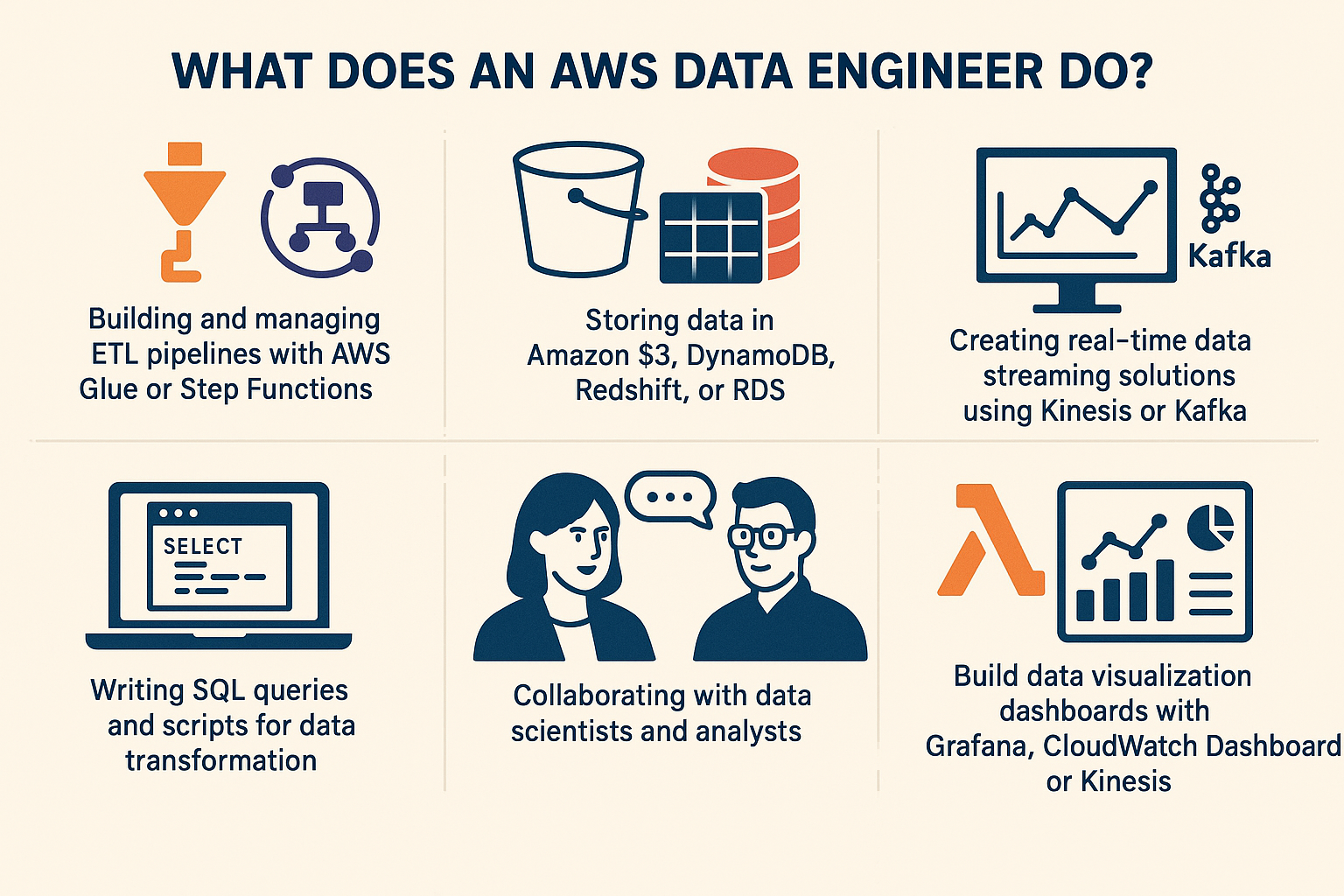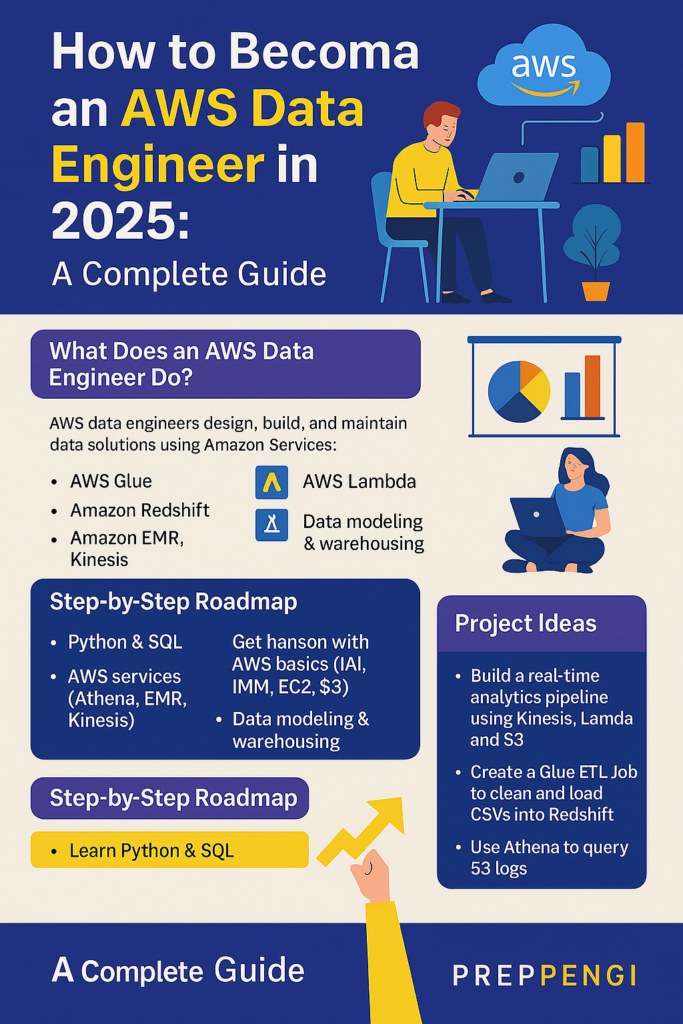How to Become an AWS Data Engineer in 2025
The demand for data engineers continues to soar, and AWS (Amazon Web Services) is at the heart of that growth. From startups to Fortune 500s, businesses are increasingly relying on AWS to build robust, scalable data pipelines. If you’re looking to break into this rewarding and future-proof career, this guide will walk you through everything you need to know to become an AWS Data Engineer in 2025.
Why AWS Data Engineering Is a Hot Career in 2025
AWS remains the top cloud platform globally, powering countless applications, data lakes, and analytics workloads. With the rise of real-time data processing, AI integration, and cloud-native architecture, AWS data engineers are more valuable than ever.
Key reasons to consider this role:
- High earning potential ($110K+ average base salary)
- Remote-friendly and in-demand across industries
- Opportunities to work on cutting-edge technologies (Glue, Redshift, Athena, Kinesis)
What Does an AWS Data Engineer Do?
An AWS Data Engineer designs, builds, and maintains data infrastructure on AWS. Their job is to Extract , Clean-Up and move data securely and efficiently, prepare it for analysis, and ensure systems are scalable, reliable, and cost-effective.
Common Responsibilities:
- Building and managing ETL pipelines with AWS Glue or Step Functions
- Storing data in Amazon S3, DynamoDb ,Redshift, or RDS
- Creating real-time data streaming solutions using Kinesis or Kafka
- Writing SQL queries and scripts for data transformation
- Collaborating with data scientists and analysts
- Automating workflows with Lambda and CloudWatch
- Build Data Visualization Dashboard using AWS managed Grafana , Cloudwatch Dashboard or Kinesis

Core Skills You Need in 2025
To succeed as an AWS Data Engineer, you’ll need a blend of programming, cloud, and data infrastructure skills. Here are the essentials:
1. Programming Languages
- Python: Used in AWS Glue scripts, Lambda functions, and automation
- PySpark: Is the Python API for Apache Spark, used for large-scale data processing and analytics.
- SQL: Core for querying data in Redshift, Athena, and RDS
2. AWS Services
- AWS Glue (ETL processing)
- Amazon Redshift (data warehousing)
- S3 (object storage for data lakes)
- RDS (structured, relational database)
- DynamoDb(NoSQL workloads)
- Lambda (serverless compute)
- StepFunction(Orchestration)
- Apache Airflow(Orchestration)
- Kinesis (streaming data)
- Athena (serverless query engine)
- Cloudwatch (Monitoring and Visualization DashBoard)
3. Data Engineering Concepts
- Data modeling (Star, Snowflake schemas)
- Partitioning and bucketing
- Data lake architecture
- Schema evolution and metadata handling
4. DevOps & CI/CD
- Infrastructure as Code (IaC): Terraform or CloudFormation
- Version control with Git
- Monitoring with CloudWatch and SNS
Step-by-Step Roadmap to Become an AWS Data Engineer
Step 1: Learn Python and SQL
You can’t skip the basics. Python is versatile and a must for scripting, while SQL is critical for data querying and transformation.
Step 2: Master the AWS Fundamentals
Start with foundational knowledge:
- IAM (Identity and Access Management)
- EC2 and VPC basics
- S3 and lifecycle policies
- Basic networking concepts
Step 3: Get Comfortable with Data Tools
Focus on services directly related to data engineering:
- Build Glue Jobs
- Explore data in Athena
- Load and transform data in Redshift
- Trigger jobs with Step Functions or Lambda
Step 4: Build Real Projects
Practical, hands-on work is a game-changer. Try these:
- Batch Project: Ingest CSV files from S3 to Redshift via Glue
- Streaming Project: Capture clickstream data with Kinesis and process it in real-time
- Lakehouse Project: Design a lakehouse using S3 + Glue + Redshift Spectrum
Step 5: Get Certified
While not mandatory, AWS certifications help boost credibility:
- AWS Certified Data Analytics – Specialty
- AWS Certified Solutions Architect – Associate

Tools & Resources to Accelerate Your Journey
Learning Platforms:
- AWS Skill Builder (Free training from AWS)
- Coursera & Udemy (Affordable, high-quality courses)
- A Cloud Guru (Cloud-focused hands-on labs)
Books:
- Data Engineering with Python by Paul Crickard
- Designing Data-Intensive Applications by Martin Kleppmann
Communities:
- r/dataengineering (Reddit)
- AWS Community Builders
- Data Engineering Slack & Discord groups
Final Thoughts: Break Into AWS Data Engineering in 2025
Becoming an AWS Data Engineer is not just a career choice—it’s an investment in the future. By mastering the right tools, building real-world projects, and continuously learning, you’ll position yourself in a high-growth, high-impact tech role.
Whether you’re a fresh graduate, a career switcher, or a developer looking to specialize, there’s never been a better time to get started.
Ready to build your first pipeline? Start now, and your future self will thank you.

